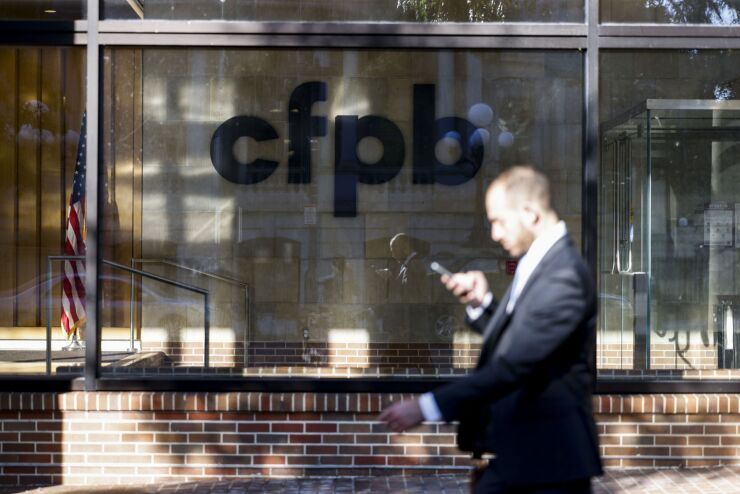Earlier this year, American Banker's Washington bureau put out a four-part series about the evolving-yet-critical thread of populism in financial regulation. To recap, a new generation of Republican lawmakers — led by now-Vice President-elect JD Vance — have embraced a message to voters that borrows some of the anti-bank rhetoric long associated with the likes of Sens. Elizabeth Warren, D-Mass., and Bernie Sanders, I-Vt., and melds it with elements of the social conservatism to create an us-versus-them pitch that defines "us" as rural, traditionalist conservatives and "them" as wealthy urban elites.
Processing Content
With Vance's ascent from junior senator from Ohio to Vice President-elect, that thread became amalgamated with Trump's various campaign messages to become what turned out to be a winning strategy. As I've mentioned before, close elections don't offer a great deal of insight into which messages succeed or fail, so there is no real way of quantifying how or whether Vance's populist bent contributed to Trump's success — though proposals like cutting taxes on tips and limiting credit card interest rates to 10% suggest that ideological strain got some purchase on the campaign. Put another way, either by driving the train or simply hitching a ride, conservative economic populism is going somewhere.
Contrast that with the liberal economic populism we have come to expect from the Democratic left. That message is rooted in the outrage that followed the Great Financial Crisis of 2007-8 and the attendant bailouts, golden parachutes and evident nonchalance on the part of banks and regulators alike toward financial stability. Democrats like Warren and Sanders have profitably mined that lode for close to 20 years, and that outrage has accomplished now-unimaginable feats in reforming the financial regulatory apparatus since the crisis. But as the crisis fades from memory, the rhetoric surrounding it has lost some of its punch with voters.
The power of that message — or lack thereof — is evident in the failed reelection bid by now-outgoing Senate Banking Committee Chair Sherrod Brown, D-Ohio, this fall. Brown, a progressive Democrat who has made skepticism of big business — and more specifically, Wall Street — a centerpiece of his political brand, fell short of reelection by about 3.5%. That's not bad in a state where Trump beat the Democratic nominee, Vice President Kamala Harris, by about 11%, but perhaps it's an indicator that the voters who those lefty populist pitches are aimed at have moved on.
Another indicator is the lack of political cover that congressional Democrats offered their own party's regulators as they plowed ahead with the Basel III endgame proposal. In a brilliant profile of Federal Reserve Vice Chair for Supervision Michael Barr published by Kyle Campbell this week, one of the aspects of that now-infamous proposal that caught my attention was how different former VCS Randal Quarles' experience in the job was compared with Barr's, particularly with regard to Congress. Quarles' signature reforms — implementing the stress capital buffer and developing a "tailoring" regime for macroprudential standards for midsize banks — were either the prior administration's initiative or explicitly mandated by Congress. Barr, by contrast, was largely left to his own devices in negotiating Basel III — a task one might liken to trying to fit a twin-size sheet on a queen-size bed. When it didn't work, the egg was on Barr's face, and with only limited exceptions, Democrats let it stay there.
That brings us to now, when we're about to see just how potent the Republican iteration of populism is within Trump's second administration. Case in point: Consumer Financial Protection Bureau Director Rohit Chopra recently finalized a rule requiring banks, in effect, to limit overdraft fees to $5 unless they disclose the annual percentage rate of the overdraft fee in terms of a loan.
As a piece of regulation, the overdraft rule has some flaws. For one, I think one could probably persuade a sympathetic federal judge that the differences between the proposed and final rule are too great to justify finalization. More substantively, there are operational issues with disclosing the APR of an overdraft fee because neither the bank nor the customer knows ahead of time how much the bank will be lending and thus how much an APR would be.
But as a political dare, the rule is genius. The incoming Trump administration has made the CFPB a prime target for either severe oversight or outright elimination, and as the foremost regulatory thorn in the finance industry's side, one might expect any rule from the bureau to be on the chopping block as a matter of principle. But as Kate Berry pointed out in a story published this morning, gutting this rule might be a bad look, and could undermine whatever populist message the nascent Trump administration is trying to cultivate.
In other words, the exiting Biden administration is laying a trap for the Trump administration: Nix these rules and we will expose you as the faux-populist poseurs you really are. That message may not resonate now, or on its own — but combine it with, say, an environment of rampant crypto scams or ballooning inflation, Democrats may have themselves a ball game in 2026 and 2028.
One can debate the efficacy or wisdom of the economic populism of the Democratic left — most notably its fixation on bank capital as a cure-all for financial instability — but one cannot reasonably question that their convictions are sincere. The Trump administration's amalgamated promise of deregulation and pro-consumer populism, however, remains untested in practice. If the Trump administration's impulse to cut regulations wins out over its promises to cut consumer costs, Republicans will be painted by Democrats as corporate shills — or, worse, as liars. If they adopt the more public-facing proposals like CFPB's overdraft rule — even with revisions — Democrats can at least claim partial victory and reinforce their populist bona fides. Whichever way the administration goes, they will have to step lightly.







